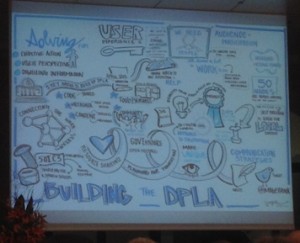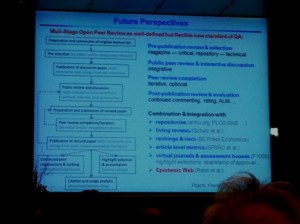The Berlin11 meeting which took place in Nov 2013 was a very energetic, motivating and inspiring event, and it can only be hoped that especially the newly introduced satellite meeting for young scientists will take place again next year. The presentations of this conference will soon be online (berlin11.org).
I would like to use this blog to highlight some of the presentations and events of Berlin11 in relation to the developments of 2013. First of all the Berlin11 conference was the first ever that hosted a satellite conference aimed at young scientists. This reflects the increasing support for open access with the young generation of scientists. One of the highlights here was the presentation of Jack Andraka, a 16 year old scholar who told his story on the role of open access for him and his development of a innovative test for pancreatic cancer.
Another highlight of the Satellite Conference was the launch of the OpenAccess Button which collects instances where people cannot access information because of toll barriers AND even suggests ways on how to find the information elsewhere in e.g. open access repositories (link here).
At the main conference Mike Taylor, a scientist and open access advocate from the UK, gave a compelling talk on why the open access movement needs idealists and why the (also economic) benefits of open access far outweigh the cost (slideshare via this link). Bernard Rentier, Rector of the University of Liege, told of his solution for getting scientists to submit their articles to the university repository: only those articles deposited count for tenure and promotion. Robert Darnton, professor at Harvard University, had a fascinating presentation on the building of the Digital Public Library of America which gives access to over 5,5 million items from libraries, archives and museums.

Slide of Robert Darnton’s presentation at Berlin11.
Marin Dacos from OpenEdition, France introduced OpenEdition the major European portal for digital publications, including books, in human and social sciences. Glyn Moody, science journalist from the UK, gave a captivating talk called ‘Half a Revolution’ on the history of the internet, open source software and open access publications. He made a very strong plea for open access without embargo calling it zero embargo now: ZEN. The slides of his talk are available here. David Willetts, Minister from the UK, explained the UK government’s policy for Open Access and as a side-line announced the imminent launch of an Science WIKI platform.
Ulrich Pöschl of the university of Mainz, Germany, elaborated on the need for other systems of peer-review and public discussions on published articles. The standard peer-review system has become so flawed that we urgently need to find ways to replace this scientific quality measure with new methods of quality assessment. He gave a talk at Berlin11 very similar to the one he gave at the ALPSP seminar on the future of peer-review in London 1 week earlier. He puts his ideas on interactive open access publishing to practice in the journal Atmospheric Chemistry and Physics. According to Pöschl a new multi-stage peer-review system in combination with Open Access will lead to improved scientific quality assurance. The process of interactive open access publishing has 2-stages: rapid publication of a discussion paper, public peer review and interactive discussion, 2) review completion and publication of the Final Paper. The use of a discussion paper guarantees rapid publication, open access enables public peer-review and discussion with a large number of participants, and the number of individual reviews possible in this system is a build-in quality assurance for the final paper. Interestingly, quality assessment using this scheme can also incorporate altmetrics and other measures of impact assessment.

Slide of Ulrich Pöschl ‘s presentation at Berlin11
Two main topics during the conference were the call for immediate unrestricted access, Zero Embargo Now (Glyn Moody) and the call for a new scientific quality assessment system (many speakers). The current quality assessment systen focuses on where you publish (rewarding publication in high impact journals) and on the number of publications (the ‘publish or perish’ ). A general feeling on what such a new assessment should look like is summarized in a key message from the presentation that Cameron Neylon gave : “it should not be that important where and how much you publish but rather what and what quality you publish”.
I would add to this that in a sense in DOES matter where you publish, namely as far as you publish your work open access allowing for unrestricted re-use. One of the main problems here is how to create the right incentives for scientists to publish open access. We have seen one possible solution in the idea given by Bernard Rentier (see above). In addition a completely refurbished assessment system could provide the right incentives when this system takes into account access, re-use, (social) impact and quality of publications. The current scientific culture with its emphasis on quantity and status is slowly but surely undermining the quality of science, because quantity is fundamentally different from quality. In their need to publish as much as possible as quickly as possible, scientists often duplicate results and/or publish results prematurely. Extreme cases of fabricated results are also seen and it is especially when these cases are found out that the reputation of science suffers. The conventional peer-review system used for quality assessment has proven to be insufficiently robust to prevent this, and new forms of peer-review and other methods are being developed to replace it (see for instance F1000).
The prioritization of publishing and doing research has had a very negative impact on education and the quality of research. It was for this reason that Science in Transition was founded in October 2013 in Amsterdam. The initiators felt that “science does not work as it should” and that something ought to be done about it. The central message again is that the pressure to publish is detrimental to education, and that the quality of science and its reputation is compromised by the current systems and judging scientific output by the number of publications. The full text of the position paper can be read here.
In a TV interview on Dec 30, 2013 Robbert Dijkgraaf, president of the Princeton Institute for Advanced Study put it this way:
“we have to judge science more by its value than by the number [of scientific output]”.
That there is growing awareness of the need for change in the area of scientific quality assessment is also illustrated by these citations taken from the New Year’s speech of the rector of the University of Amsterdam, prof. van den Boom: “More publications is not always better”, and “we have to think hard on alternatives for the evaluation of research”. ( full speech can be seen here). In the two months that have passed since Berlin11, Open Access and the Quality of Science have received considerable public media attention. The German magazine “Die Zeit’’ for example has published a set of articles in its first issue of 2014 on ‘how to save science’. A new case of (self) plagiarism has led to heated discussions in Dutch newspapers on the uncertain quality of science and the possibilities of fraud. The president of the organization of Dutch universities, Karl Dittrich has announced that starting Jan 2015 more emphasis will be put on quality, away from quantity of scientific publications in the evaluation of scientists and universities.
The Dutch state secretary for research and education Sander Dekker previously already had stated that scientific results should be published in open access journals as of 2016, even by law if scientists will not abide out of free will. Also on the issue of Open Access, the US congress in Jan 2014 approved the so-called 2014 omnibus appropriations legislation. This policy shall require public, free access to each paper based on researches even partially funded by a federal agency, submitted to any peer-review journal, no later than 12 months after the publication. Although this move towards open access is great news, the drawback here is that the bill only deals with free access, the issue of re=use and copyright is left in the open. Also, the 12 month embargo period is not in line with open access in the sense of the Berlin declaration. So it is a step forward but there still is a long way to go, as Mike Taylor says it in his latest blog post.
Let me conclude this blog by a small prediction: that 2014 will be the year that scientific output will be judged less and less by how much and where one has published, and more and more by what and in what (accessible and re-usable) form one publishes his/ hers results.
 Open Access Working Group
Open Access Working Group 



